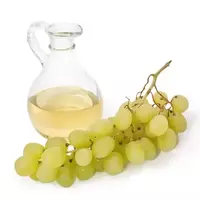Grape seed oil

Grape seed oil is ranked among the group of vegetable oils that have found widespread use, as well as application not only in the field of cooking. Grape oil is used in the pharmacological as well as cosmetic industries as a healing ingredient which is included in various medicinal products. Oil from grape seeds is isolated from the seeds of various varieties of the grape plant.
The properties of grape seed oil and the vitamin-mineral composition of the product depend on the type of grapes, as well as the method of production of the product. As a rule, an extraction process is used to obtain oil from grape seeds, as well as a universal method for producing oils, which is called cold pressing. However, the second method of producing the oil is more costly both in time and financially than the extraction process.
True, the beneficial properties of grape seed oil, as well as the vitamin and mineral composition of the product, will be strikingly different for the better. The cold pressing method helps to preserve in the oil a larger amount of useful natural compounds and biologically active components, which are enriched with the starting natural material, i. e. grapes.
The benefits of grape seed oil
The exclusivity of the benefits of grape seed oil lies in the chemical composition of the product, as well as the distinctive properties. For example, grape oil differs in its cytoprotective, regenerative, as well as antioxidant abilities. In cooking, oil is used as an aromatic food additive, which is usually used for high-temperature food preparation methods.
The thing is that grape seed oil begins to smoke at temperatures above 200S and exudes a pleasant characteristic aroma that is used in the food industry to give a special taste and smell to finished food products. In addition, grape seed oil is considered an excellent salad dressing or a component ingredient in high-quality mayonnaise and sauces.
However, most often grape seed oil is used to make shrovetide extracts from spices and spices, for example garlic or rosemary. In addition to the culinary sphere, grape seed oil is used for medical purposes. Grape seed oil-based medicines are thought to be able to help with a variety of injuries, abrasions, burns and other skin damage. Grape seed oil has a positive effect in various skin diseases.
The product is capable of having a regenerating, tonic and restorative effect on the skin of the human body. The composition of grape seed oil includes such useful natural amino acids as: linoleic, palmitic, oleic, stearic and alpha-linoleic acids.
In addition, grape seed oil contains in its chemical composition useful and indispensable for humans natural biologically active compounds of tocopherol, campesterol, stigmasterol and beta-citesterol. Perhaps grape oil is inferior in some respects to the characteristics of other types of vegetable oils, but this does not mean that the product will not be able to become an excellent source of vitamins and minerals for the human body.
grape seed oils 900 kCal
Energy value of grape seed oil (Ratio of proteins, fats, carbohydrates - ju):
Proteins: 0 g (~ 0 kCal)
Fats: 100g (~ 900 kCal)
Carbohydrates: 0 g (~ 0 kCal)
Energy ratio (b | y): 0% | 100% | 0%
 Español
Español Français
Français Português
Português Русский
Русский 简体中文
简体中文 繁體中文
繁體中文 日本語
日本語 한국어
한국어 العربية
العربية Türkçe
Türkçe Қазақ
Қазақ Deutsch
Deutsch Italiano
Italiano Українська
Українська
